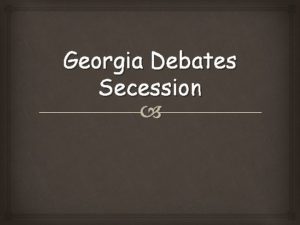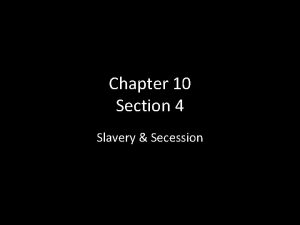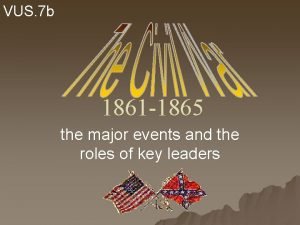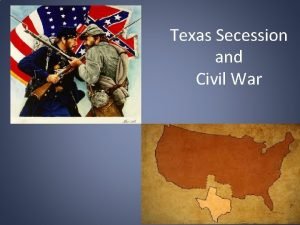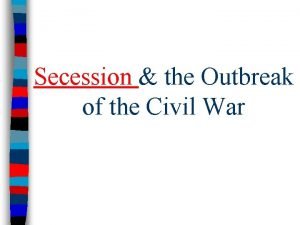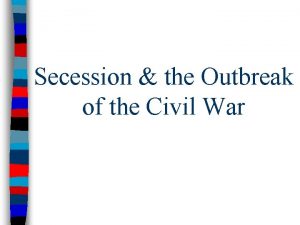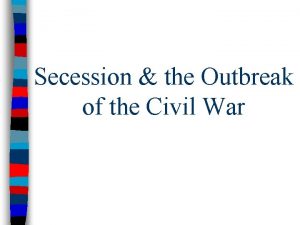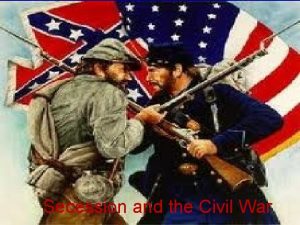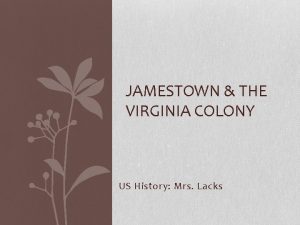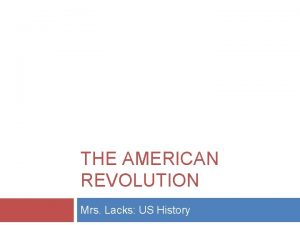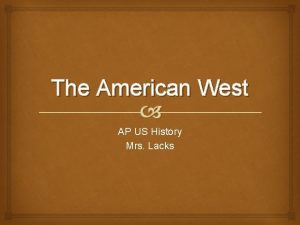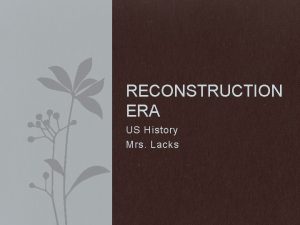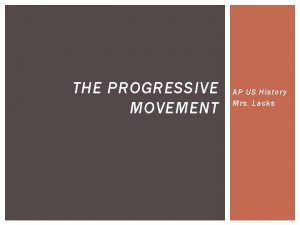THE ROAD TO SECESSION US History Mrs Lacks








































- Slides: 40

THE ROAD TO SECESSION US History Mrs. Lacks

CAUSES OF CIVIL WAR v. Civil war: war between two or more groups within one country v. The issue of slavery was one of many causes of civil war, as is the idea of states’ rights vs. rights of the federal government v. There are political, cultural, & economic causes

CAUSES OF CIVIL WAR v. Missouri Compromise v. Kansas-Nebraska Act/ v. Tariff of Abominations. Bleeding Kansas v. Abolitionist Movementv. Dred Scott v. Sanford v. Wilmot Proviso v. Compromise of 1850 v. Uncle Tom’s Cabin v. Lincoln-Douglass Debates v. Harper’s Ferry, Va (WV) v. Election of 1860

MISSOURI COMPROMISE v. Split the country politically into 2 parts: north & south v. Missouri enters union as slave state v. Maine enters union as free state v. Slavery banned in the Louisiana Territory north of the 36 30' line


WILMOT PROVISO v. Proposed by PA representative David Wilmot v. Said no slavery in Mexican Cession videa of “free soil” - allow slavery to exist where it already was but not spread into new territory vconstitutional issues - constitution protects property • slaves = property in south • Congress has no right to limit slavery in territories • would upset the balance vbill failed!!

COMPROMISE OF 1850 v. The Issues • California applied for statehood as a free state (does not fall under Missouri Compromise - not part of Louisiana Terr. ) • northerners demand abolition of slavery in DC • south wanted north to enforce Fugitive Slave Act of 1793

COMPROMISE OF 1850 v. Very controversial v. How it passed: • President Taylor was dragging his heels – Senate feared he would veto the bill • July 1850 - Taylor died suddenly succeeded by Millard Fillmore who supported the Compromise • September 1850 - Compromise passed

COMPROMISE OF 1850

POLITICAL PARTIES IN 1840 S v. Democrats (started with A. Jackson) v. Whigs (anti-Jacksonians) v. New parties forming: • Free-Soilers • Know-Nothings (Northern anti-immigrant (esp Irish), anti-Catholic, anti-free African)

1852 PRESIDENTIAL ELECTION √ Franklin Pierce Democrat Gen. Winfield Scott Whig John Parker Hale Free Soil

Uncle Tom’s Cabin § Sold 1852 300, 000 copies in the first year. § 2 million in a decade!

Harriet Beecher Stowe So this is the lady who started this big war. -- Abraham Lincoln


KANSAS-NEBRASKA ACT vdivided Nebraska Territory into Nebraska and Kansas vallowed them to decide slavery issue by popular sovereignty (let the people decide) vdid away with the 36 30' line of the Missouri Comp. v"Death of the Missouri Compromise"


KANSAS-NEBRASKA ACT v. Major results of Kansas-Nebraska Act • birth of the Republican Party • split Democratic party and destroyed already badly divided Whigs • Led to “Bleeding Kansas”

BLEEDING KANSAS v. People rushed in to Kansas to vote for or against slavery vwhen time came to hold elections, 1000 s of “border ruffians” from neighboring Missouri (slave) came it and voted illegally v. Kansas became a slave state

BLEEDING KANSAS v. Anti-slavery voters did not want to accept this v. Two capitals were established • Lecompton: proslavery • Topeka: anti-slavery v. Civil war erupted in Kansas when proslavery people attacked antislavery people

“Bleeding Kansas” Border “Ruffians” (pro-slavery Missourians)

BLEEDING KANSAS v. John Brown • Religious fanatic (thought he was God’s instrument) • Very antislavery • Started a massacre that led to the deaths of 200 proslavery citizens

SUMNER-BROOKS AFFAIR v. Senator Charles Sumner gave a speech denouncing slavery advocates, including Sen. Andrew Butler from SC v 2 days after speech, Sen. Preston Brooks (SC and nephew of Butler) approached Sumner to confront him about his speech v. Brooks beat Sumner with his cane on the Senate floor

“The Crime Against Kansas” Sen. Charles Sumner (R-MA) Con. Preston Brooks (D-SC)

“Bleeding Sumner”

BIRTH OF THE REPUBLICAN PARTY, 1854 ßNorthern Whigs. (anti-slavery) ßNorthern Democrats. (anti-slavery) ßFree-Soilers. (anti-slavery) ßKnow-Nothings. (restrictions on immigration) ßOther miscellaneous opponents of the Kansas. Nebraska Act.

1856 PRESIDENTIAL ELECTION √ James Buchanan Fillmore Democrat John C. Frémont Republican Millard Whig

1856 Election Results

TARIFF OF ABOMINATIONS v. Still in tact since the 1820 s v. Made South trade with North almost exclusively v. Southerners lost what could be made in Europe v. Led to the Panic of 1857 v. Increases Southern anger at North v. South Carolina tries to secede in 1858, but

Dred Scott v. Sanford, 1857

DRED SCOTT V. SANFORD v. Dred Scott was a slave belonging to an officer in the US army vtaken from Missouri (slave) to Illinois (free) then to Wisconsin Terr. (Free by Missouri Comp) and back to Missouri vafter master died, Scott sued new master for freedom, claiming that since he had lived on free soil then he was free vcase went to Supreme Court - took 3 years to decide

DRED SCOTT V. SANFORD v. Chief Justice Roger B. Taney along with majority decided • Scott was still a slave, not a citizen, therefore had no right to sue in federal court • Congress had no power to prohibit slavery in the territories, therefore the Missouri Compromise was unconstitutional

The Lincoln-Douglas (Illinois Senate) Debates, 1858 A House divided against itself, cannot stand.

LINCOLN-DOUGLASS DEBATES v. Illinois Senate seat v. Incumbent: Stephen Douglass v. Challenger: Abraham Lincoln v. First series of open discussions/debates about slavery

LINCOLN-DOUGLASS DEBATES v. Douglass: Popular Sovereignty v. Lincoln: let slavery stay in the South, but not extend to new territories in the west v. Lincoln lost, Douglass kept his Senate seat

John Brown’s Raid on Harper’s Ferry, 1859

HARPER’S FERRY, VA v. John Brown led a band of men into Harpers Ferry in order to seize the federal arsenal and lead a slave rebellion (aka “army of emancipation”) vthey took 60 hostages and held out against the local militia vfinally surrendered to Marines under Robert E. Lee v. Brown wounded and taken prisoner vconvicted by Commonwealth of Va of treason, murder, and inciting slave rebellion

1860 √ Abraham Lincoln PRESID John Bell Constitutional Republican ENTIAL Union ELECTIO N Stephen A. Douglas Northern Democrat John C. Breckinridge Southern Democrat

1860 Election Results


Secession!: SC Dec. 20, 1860
 The immortal life of henrietta lacks table of contents
The immortal life of henrietta lacks table of contents Necessities lacks and wants
Necessities lacks and wants Howard w jones
Howard w jones Syphilus
Syphilus Debate over secession in georgia
Debate over secession in georgia Chapter 10 section 4 slavery and secession
Chapter 10 section 4 slavery and secession Propaganda movement members and their pen names
Propaganda movement members and their pen names The wilmot proviso proposed that
The wilmot proviso proposed that The immortal life of henrietta lacks discussion questions
The immortal life of henrietta lacks discussion questions Jasmine had thought that her irresponsible days of
Jasmine had thought that her irresponsible days of Toward civil war lesson 3 secession and war
Toward civil war lesson 3 secession and war Work on the production line is monotonous and lacks
Work on the production line is monotonous and lacks Vus 7a what event sparked secession of the southern states?
Vus 7a what event sparked secession of the southern states? Flagella whip
Flagella whip They are mrs garcia and mrs castro
They are mrs garcia and mrs castro They are mrs garcia and mrs castro
They are mrs garcia and mrs castro Mrs. darling was ___________ of mrs. s.
Mrs. darling was ___________ of mrs. s. What is paved and unpaved road
What is paved and unpaved road Mrs turnbull world history
Mrs turnbull world history Hình ảnh bộ gõ cơ thể búng tay
Hình ảnh bộ gõ cơ thể búng tay Frameset trong html5
Frameset trong html5 Bổ thể
Bổ thể Tỉ lệ cơ thể trẻ em
Tỉ lệ cơ thể trẻ em Chó sói
Chó sói Tư thế worms-breton
Tư thế worms-breton Hát lên người ơi
Hát lên người ơi Các môn thể thao bắt đầu bằng tiếng nhảy
Các môn thể thao bắt đầu bằng tiếng nhảy Thế nào là hệ số cao nhất
Thế nào là hệ số cao nhất Các châu lục và đại dương trên thế giới
Các châu lục và đại dương trên thế giới Cong thức tính động năng
Cong thức tính động năng Trời xanh đây là của chúng ta thể thơ
Trời xanh đây là của chúng ta thể thơ Mật thư anh em như thể tay chân
Mật thư anh em như thể tay chân Phép trừ bù
Phép trừ bù Phản ứng thế ankan
Phản ứng thế ankan Các châu lục và đại dương trên thế giới
Các châu lục và đại dương trên thế giới Thể thơ truyền thống
Thể thơ truyền thống Quá trình desamine hóa có thể tạo ra
Quá trình desamine hóa có thể tạo ra Một số thể thơ truyền thống
Một số thể thơ truyền thống Cái miệng xinh xinh thế chỉ nói điều hay thôi
Cái miệng xinh xinh thế chỉ nói điều hay thôi Vẽ hình chiếu vuông góc của vật thể sau
Vẽ hình chiếu vuông góc của vật thể sau Nguyên nhân của sự mỏi cơ sinh 8
Nguyên nhân của sự mỏi cơ sinh 8




